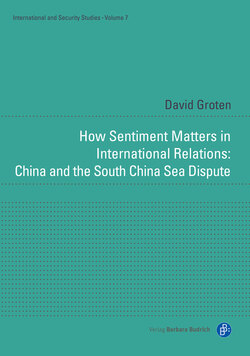Читать книгу How Sentiment Matters in International Relations: China and the South China Sea Dispute - David Groten - Страница 24
На сайте Литреса книга снята с продажи.
2.3 Operationalization of Respect and Disrespect
ОглавлениеPrevious chapters have loosely touched upon a number of theoretical limitations and obstacles accompanied by the study of respect (and emotion) in IR research. They range from identification issues to questions of measurement, definition, reference and issues of application to the collective/state level. That said, this chapter takes up some of these challenges and sets forth the theoretical operationalization.
Broadly speaking, it is the primary objective of this project to examine the role of (dis)respect experiences in China’s South China Sea policy. These experiences are generally operationalized as discursive manifestations of respect and disrespect reflected in discourses by two leading Chinese foreign policy think tanks (FPTTs) (chapter 2.4). In doing so, the applicability of respect to the realm of foreign policy is taken for granted as it is assumed that individual perceptions and expectations of FPTT staff convert into collective perceptions of the political elite if shared by a significant preponderance of scholars (at a given time). In this way, dominant perceptions of disrespect can turn into collective disrespect experiences. Such collective experiences and associated emotions and responses to out-group behavior may be just as strong [50] or even stronger than on the interpersonal level64 (Kelman, 2008).
Furthermore, manifestations of respect experiences are essentially operationalized as tantamount to the lack of significant signals of disrespect experiences. This is because positive accounts of respect, due to the ‘negativity bias’ phenomenon, are much less common and, thus, much more difficult to identify. Similarly, it is not concrete PRC policy measures that are subject to analysis but policy recommendations and preferences advocated and articulated by FPTT scholars (dependent variable).
Moreover, the collective entity subject to analysis consists of scholars who published articles in two journals by two highly prestigious Chinese foreign policy think tanks (FPTTs) between 2010 and 2016 on issues revolving around the South China Sea. Both institutions are considered significant actors of Chinese foreign policy.65 That said, these groups’ dominant perception patterns of the PRC, which both FPTTs are directly associated with, and their assessments in terms of the adequacy level of SCS-related conduct by other parties will be identified and closely studied.
The fourth challenge covered involves the issue of identification of respect dynamics and respect experiences66. In general, respect considerations including an actor’s status and identity needs are not articulated literally and directly in the majority of cases67. Hence, respect dynamics have to be analytically extracted from the wider context of using qualitative data analysis and further qualified by means of the theory-guided hypotheses68 provided. In this vein, reference points and indicators are called for in order to guide and enable respect and disrespect identification processes. These reference points and indicators are outlined in the following.
